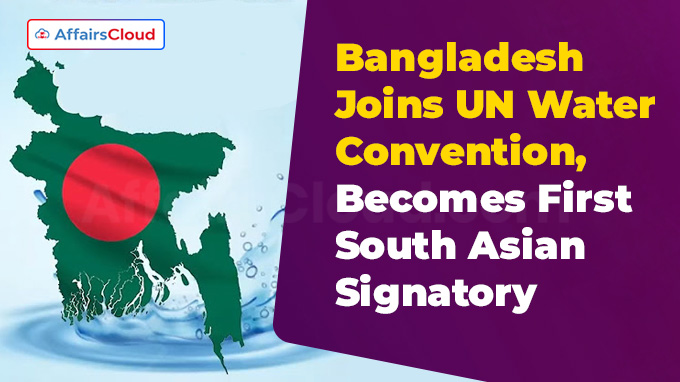Bangladesh became the 1st South Asian country as well as 56th country globally, to join the United Nations (UN) Water Convention which is officially known as the Convention on the Protection and Use of Transboundary Watercourses and International Lakes, on June 20 2025.
- This move is expected to help Bangladesh in protecting and managing waterways that represent a ‘lifeline to peace and prosperity’.
Exam Hints:
- What? Bangladesh Joined UN Water Convention
- Significance: 1st South Asian Country to Join Convention
- Total Signatories: 56 (India is non-signatory)
- Official Name of Convention: Convention on the Protection and Use of Transboundary Watercourses and International Lakes
- About UN Water Convention:
- Adopted in: 1992 (Helsinki, Finland)
- Came into Force: 1996
- Expansion: To All UN Member States (Since March 2016)
- Aligns with: UN SDGs (SDG 6.5, SDG 2, SDG7 SDG 13)
Key Reasons:
Cross-Border Water Cooperation:Bangladesh as a deltaic country with 57 transboundary rivers-most notably the Ganges-Brahmaputra-Meghna (GBM) water system spanning countries like: China, Nepal, Bhutan, India; depend heavily on effective cross-border water cooperation.
Vulnerable to Floods: Around 60% of Bangladesh’s population is prone to high flood risk which more than any country in the world except the Netherlands and also 45% of population is vulnerable to high fluvial flood risk, the highest proportion in the world.
Lack of Proper Sanitation: Also, over 65 million people in Bangladesh still lack access to safe and properly managed sanitation facilities.
Goal: Aligns with global UN efforts on water governance and sanitation ahead of the UN Water Conference scheduled in December 2026 in UAE.
About UN Water Convention:
Legally Binding: It is a unique legally binding instrument which aimed at promoting the sustainable management of share water resources and the implementation of the Sustainable Development Goals (SDGs).
Background: The UN Water Convention was formally adopted in Helsinki, Finland in 1992 but officially came into force in 1996.
Initially a Regional Framework: It was initially negotiated as a regional framework for the pan-European region.
Mandate: The member countries or parties to the convention are require preventing, controlling and reducing transboundary impact, using transboundary waters in a reasonable and equitable manner and ensure their sustainable management.
- Also, parties sharing the same transboundary waters have been mandated to cooperate by entering into specific agreements and setting up joint bodies.
Open for All UN Member States: Following an amendment to the convention, it has been opened for all member states UN, since March 2016.
Expansion to Non-European Nations: Since 2016, various non-European nations mostly from Sub-Saharan Africa, Middle East and Latin America regions, had acceded to the convention like: Chad (2018), Ghana (2020), Guinea-Bissau and Togo (2021); Cameroon (2022); Nigeria (2023); Iraq (2023), Panama (2023), among others.
Powerful Tool for SDGs: This water convention is a powerful tool to promote and operationalize the achievement of 2030 Agenda for SDGs. It provides support for the implementation of target 6.5 (implement integrated water resource management) and indirectly other SDGs like: SDG 2(Zero-hunger, achieve food security, and improved nutrition and promote sustainable agriculture); SDG 7 (affordable and clean energy); SDG 13 (climate action), among others.
Sierra Leone as 57th Member: In September 2025, Sierra Leone officially joined the UN Water Convention to become the 57th country globally.
India Non-Signatory: As of now, India is not a signatory to the convention as it prefers bilateral agreements to resolve cross-border water issues like: Indus Water Treaty (IWT) signed with Pakistan (in 1960) and Ganges Water-sharing Treaty signed with Bangladesh (in 1996).
About Bangladesh:
Capital- Dhaka
Interim Head– Muhammad Yunus
Currency- Bangladeshi Taka (BDT)





